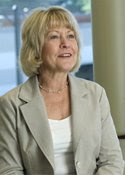Monday, October 20, 2008
I was surprised to learn the term pre-conception care from Sarah Brown, co-founder of the National Campaign. When I was 26 and wanting to get pregnant with my first child, it never occurred to me to prepare myself physically like an athlete getting ready to run a marathon. I knew I needed to get prenatal care after I got pregnant: take a few vitamins and get monthly checkups. But thinking about whether I was healthy enough to bear a healthy child? It never occurred to me. I seemed healthy. I didn’t even have a doctor when I got married. The clinic where I got my birth control pills was my only healthcare. Sarah is right. Women who lack immunizations, have issues of alcoholism, drugs, obesity, or who have chronic diseases like diabetes, might have trouble birthing a healthy baby or might endanger her own health without pre-conception care. Having a health issue doesn’t mean a woman can’t give birth to a healthy baby, but it means women must be taught to plan and prepare for pregnancy; it shouldn’t take her by surprise.
We Plan What We're Having For Dinner, But Not Pregnancy?
We recently had Sarah Brown, CEO of the National Campaign to Prevent Teenage Pregnancy and Unplanned Pregnancy, here in Des Moines to continue our conversation about reducing the number of unintended pregnancies among adult women in Iowa. She visited with family planning service providers from around the state, legislators, journalists and professionals connected with this issue.
Sarah says Americans plan everything: household budgets, vacations, what we’re having for dinner. She quoted a New York Times article that mentions the increase in wedding planners in the U.S. Yet we don’t plan pregnancies. Even though giving birth and having children is one of our most important acts, with a permanent impact on our lives, we don’t discuss the decision with partners or plan individually (especially 20 year-olds). Too many sexually active people don’t think about the consequences an unintended pregnancy might have on income, education, time or energy.
Sarah encourages parents and caring adults to include talking about the planning pregnancy along with the other issues we encourage young people to consider as they reach adulthood. This includes talking with family planning professionals about choosing a birth control method that meets each couple’s needs.
Sarah says Americans plan everything: household budgets, vacations, what we’re having for dinner. She quoted a New York Times article that mentions the increase in wedding planners in the U.S. Yet we don’t plan pregnancies. Even though giving birth and having children is one of our most important acts, with a permanent impact on our lives, we don’t discuss the decision with partners or plan individually (especially 20 year-olds). Too many sexually active people don’t think about the consequences an unintended pregnancy might have on income, education, time or energy.
Sarah encourages parents and caring adults to include talking about the planning pregnancy along with the other issues we encourage young people to consider as they reach adulthood. This includes talking with family planning professionals about choosing a birth control method that meets each couple’s needs.
Subscribe to:
Comments (Atom)




